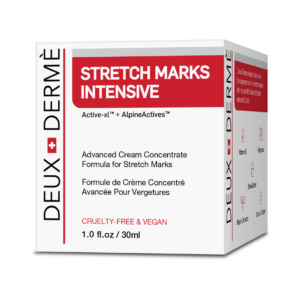It’s likely that you’ve heard some things in your life about stretch marks that are completely untrue. Stretch mark myths may lead you to believe that you’re not at risk for developing stretch marks, that you’ll never get rid of your stretch marks, or that you’ll have to undergo some expensive and dangerous treatment to get rid of your stretch marks. Below we’ve listed the most common misconceptions about stretch marks. Read on to discover the truth behind the myths.
Stretch Marks Are Only Caused by Pregnancy
A common misconception about stretch marks is that only women get them or that they only develop while a woman is pregnant. In reality, anyone can develop stretch marks. Adolescent boys and girls sometimes get them due to hormone changes and growth spurts. Men frequently get them as well due to rapid weight gain or steroid use.
Stretch Marks Are Caused by Weight Gain
Weight gain is one cause of stretch marks, but rapid weight loss can cause stretch marks to appear as well. Because of this, it’s important for people starting new diet or exercise programs to take steps to prevent stretch mark development.
Stretch Marks Go Away on Their Own
Unfortunately, stretch marks will never fully disappear on their own. While they may fade over time without treatment, the only way they will disappear is if they are treated.
Stretch Mark Treatments Are Covered by Insurance
Some people opt to have their stretch marks treated by a doctor using procedures like microdermabrasion, chemical peels, or tummy tucks. However, these treatments are very expensive and are rarely covered by health insurance. Because stretch marks do not cause health issues, most health insurance providers view treatment as cosmetic and do not provide coverage.
If you have a Flexible Spending Account or Health Savings Account, check with your health insurance provider to determine if you can use your account funds to cover treatment or purchase stretch mark prevention or removal products.
Stretch Marks Can’t Be Prevented
There are many simple ways that you can prevent stretch marks if you believe you’re at risk for developing them. Drinking plenty of water will keep your skin hydrated and less likely to break, and avoiding foods that are high in sugar content will prevent the lower layers of your skin from becoming brittle. Using a stretch mark prevention cream or lotion will also help strengthen your skin and may reduce your risk of developing stretch marks.
If You Have Stretch Marks Now, You’ll Always Have Them
Many people currently suffering from stretch marks feel as though their stretch marks are something they’ll have to suffer with forever because treatments performed by a doctor are expensive, dangerous, and impractical. However, there are many over the counter products that may reduce the appearance of stretch marks or even remove them completely. Check out our selection of stretch marks removal products to find a cost-effective solution for removing your stretch marks.




